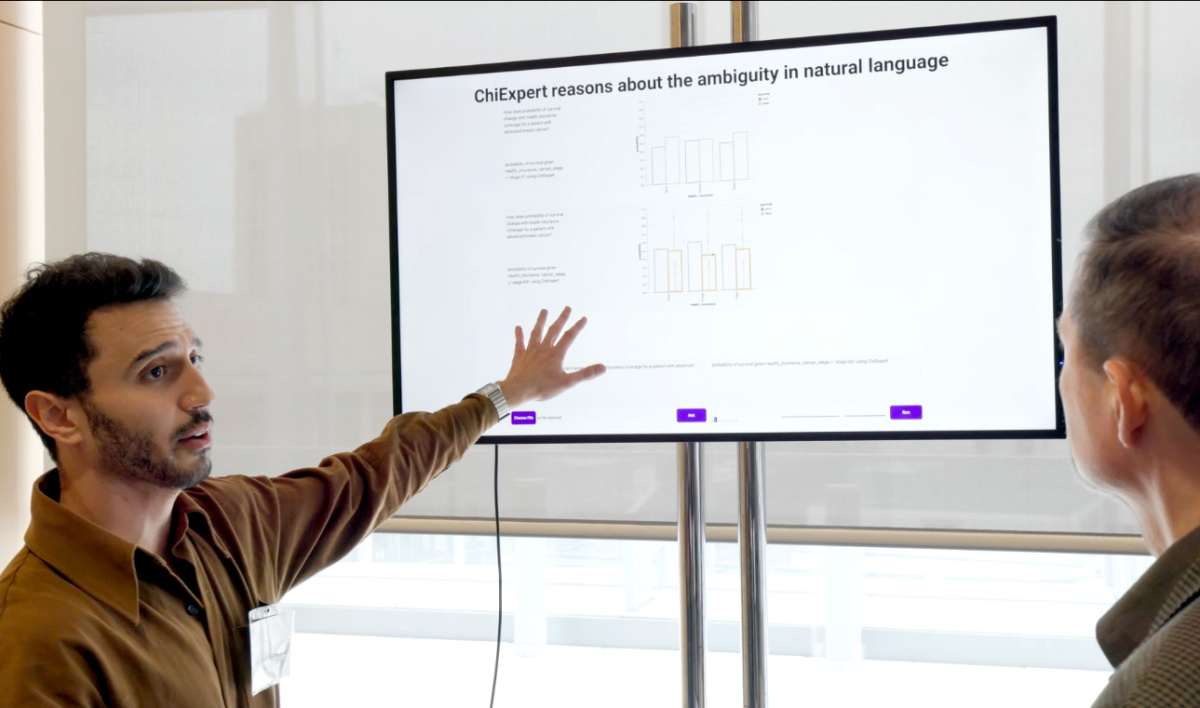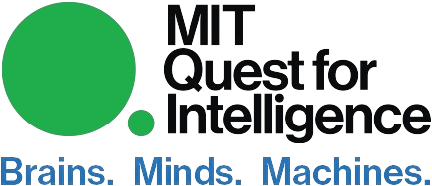The Undergraduate Research Opportunities Program (UROP) is a unique opportunity for curious and motivated undergraduate students to engage with real research projects happening in and around MIT.
The UROP program gives students the chance to explore a diverse array of disciplines, contribute to ongoing research with MIT mentors and faculty, and establish a foundation of skills and experience to pursue further study or industry work. As a UROP, students work side-by-side with a faculty member or mentor on active research in any department at MIT, developing relationships with other researchers, faculty, and graduate students along the way to build both technical skills and a robust professional network.

Missions and Platforms
- These UROPS work with a PI on specific Mission project.
- Each Mission and Platform is focused on different areas of intelligence-focused research:
- The Development of Intelligence Minds Mission aims to understand early childhood learning and its application to artificial learning systems.
- The Embodied Intelligence Mission investigates the intersections of perception, planning, and action, transferring those intersections to the engineering of intelligent robots.
- The Language Mission studies the role of language in the acquisition, representation, and use of knowledge across various domains of cognition, and works to exercise those same principles in machine learning models.
- The Perceptual Intelligence Mission seeks to produce the first machine-executable models of the human visual system that are computationally, cognitively, and neurally feasible, bringing together neuroscientists, computer scientists, and cognitive scientists towards this effort.
- The Brain-Score platform is an open-source resource for collaboration and experimentation that enables researchers to compare their computational models of vision and language processing to dozens of existing neural and behavioral benchmarks.
- The Scaling Inference platform works to establish scaling routes for large neural network models that enable them to more efficiently match human intelligence capabilities by using probabilistic programming instead of deep learning methods.
- More information on each Mission or Platform is available in the research section of the website. Please contact the Mission leads for information about UROP positions in a lab affiliated with a specific Mission or Platform.
Engineering Team
- These UROPS will also be affiliated with Missions, but will be paired with an individual member of the Quest's Engineering Team on a specific Mission project.
- Please look at the Engineering Team UROP appointments on the UROP website here.
Eligibility
All registered MIT undergraduates, Wellesley cross-registered undergraduates, and MIT Undergraduate Exchange students in good academic standing are eligible for the UROP program. Research or work at a commercial entity is not eligible for the program.
More information on the UROP program's eligibility requirements can be found here.
Quest PI Contacts
Each Mission and Platform includes multiple PIs under which UROPs can perform their research. To indicate interest in working with a particular lab for a UROP appointment, please contact both the PI and the affiliated Mission or Platform lead/s listed below:
- Developmental Intelligence: Josh Tenenbaum (quest-di-urops@mit.edu)
- Embodied Intelligence: Nancy Kanwisher (ngk@mit.edu) and Leslie Kaelbling (lpk@mit.edu)
- Language: Ev Federenko (evelina9@mit.edu) and Jacob Andreas (jda@mit.edu)
- Perceptual Intelligence: Josh Tenenbaum (jbt@mit.edu), Jim DiCarlo (dicarlo@mit.edu), and Vikash Kumar Mansingkha (vkm@mit.edu)
- Brain-Score: Kartik Pradeepan (kpradeep@mit.edu)
- Scaling Inference: Vikash Kumar Mansingkha (vkm@mit.edu)
Submitting your Proposal
After discussion with either the PI mentor (for Mission UROP appointments) or with the engineer mentor (for Engineering Team UROP appointments), students should submit their proposals via the application portal at the UROP website. Students should select 'Supervisor/Sponsored Research Funding' (not 'Direct Funding,' which will automatically reject and return your proposal). The DLC is the Quest for Intelligence and the cost object is 1111111.
Wellesley students looking to apply for a UROP position with the Quest for Intelligence will need to be cross-registered at MIT in order to be eligible for a UROP. Find more information on applying for a UROP as a Wellesley student here.
Aneesa Beckford: Brain-Score Frontend Development
This project implements an interactive visualization tool for exploring brain-model architectures on the Brain-Score platform. It displays each model layer as a stylized 3D block, enabling users to zoom, pan, and explore detailed metadata. Users can view individual or multiple layers, see their connections, and understand how each layer maps (or doesn't map) to brain regions. The tool is designed to support future integration with real neural networks and Brain-Score model cards.
Beckett Roberge: Exploring Action Planning in the Brain and its Similarity to Computer Simulations and DNNs
To explore the way humans complete simple tasks, we created a virtual reality simulation of catching a ball. We are now tracking subjects' movements and comparing them to how different computational techniques catch the ball in the same simulation.
Daria Kryvosheieva: Localization of Language Processing in LLMs
This project aims to localize units in large language models (LLMs) that are responsive to syntax (the ‘rules’ governing a language). For 67 syntactic phenomena, we identify the top 1% of LLM units with the most significant difference in activation magnitude between grammatical and ungrammatical sentences. Our experiments show that there exist LLM units that respond reliably to each phenomenon, as well as shared units for related phenomena in English and also—across diverse languages. On a high-level, this work provides insights into how LLMs generate coherent language, and offer testable hypotheses about the neural representations underlying language in the human brain.
Thomas Brewitt: Investigating Fluid Representations and Modal Super Additivity in Physics Parcels
The Physics Network (PN) is a fronto-parietal brain network involved in physical judgment and prediction. While most prior studies on the PN have focused on visual tasks with explicit instructions, we often infer physical events from sound alone in daily life (think a bowling ball rolling down a lane and striking pins). For my UROP, I worked with Vivian Paulun and RT Pramod in the Kanwisher lab to design an fMRI study investigating the role of audition in the PN and how the network responds to passive observation of physical interaction. By measuring the neural response of the PN to a variety of either auditory or visual stimuli, we found that while the PN responds strongly to visual physical interactions, it does not respond to auditory stimuli, even when this audio is of physical interactions. Still, further analysis revealed some patterns of PN activation for audio-only stimuli, indicating that audio may yet play a role in physical understanding.
Sofie Chung: Model Development in Brain-Score
I worked with the Brain-Score vision team and scored vision models on neural and behavioral benchmarks. I also modified some models to including spiking-like behavior, in attempts of making the model more biologically similar to how neurons in our brains fire. These models were scored and compared against non-spiking models.
Bianca Santi: Research on Language in Children
Our project is an effort to understand how language representations in the brain change throughout development. We test how well large language models (LLMs) trained on different amounts of data can predict sentence-level brain responses in children and adults of different ages. In an offshoot project, we also developed an automated pipeline that simplifies and accelerates the generation of animated audiovisual stimuli, and used it to generate the hundreds of video stimuli needed for the main project.
Adriana Castillo: Bridging Stimulus Library and CHS
Our project focused on automating the creation of research experiment protocols and improved UI usability to bridge the Stimulus Library with CHS. This involved translating JSON based EFP protocols into jsPsych, designing a dynamic Angular form for user input, and creating protocol examples of varying complexity to support users with different technical backgrounds. These changes significantly reduce setup time, improve user experience, and increase accessibility for CHS researchers, encouraging broader adoption of standardized experiment workflows.
An Intro to the Fast-Paced World of Artificial Intelligence (2021)
Undergraduates Explore Practice Applications of Artificial Intelligence (2021)
MIT Undergraduates Pursue Research Opportunities through the Pandemic (2020)
Bringing Artificial Intelligence into the Classroom, Research Lab, and Beyond (2020)
Undergraduates Develop Next-Generation Intelligence Tools (2020)
Exploring the Nature of Intelligence (2019)
SuperUROP: Showcasing Students' Research Work in Progress (2019)
Developing Artificial Intelligence Tools for All (2019)
MIT Undergraduates to Embark on The Quest (2018)
For Faculty - Host a Scholar
Thank you for your interest in hosting a UROP with your lab! PIs should contact the UROP office directly about setting up a UROP appointment.
